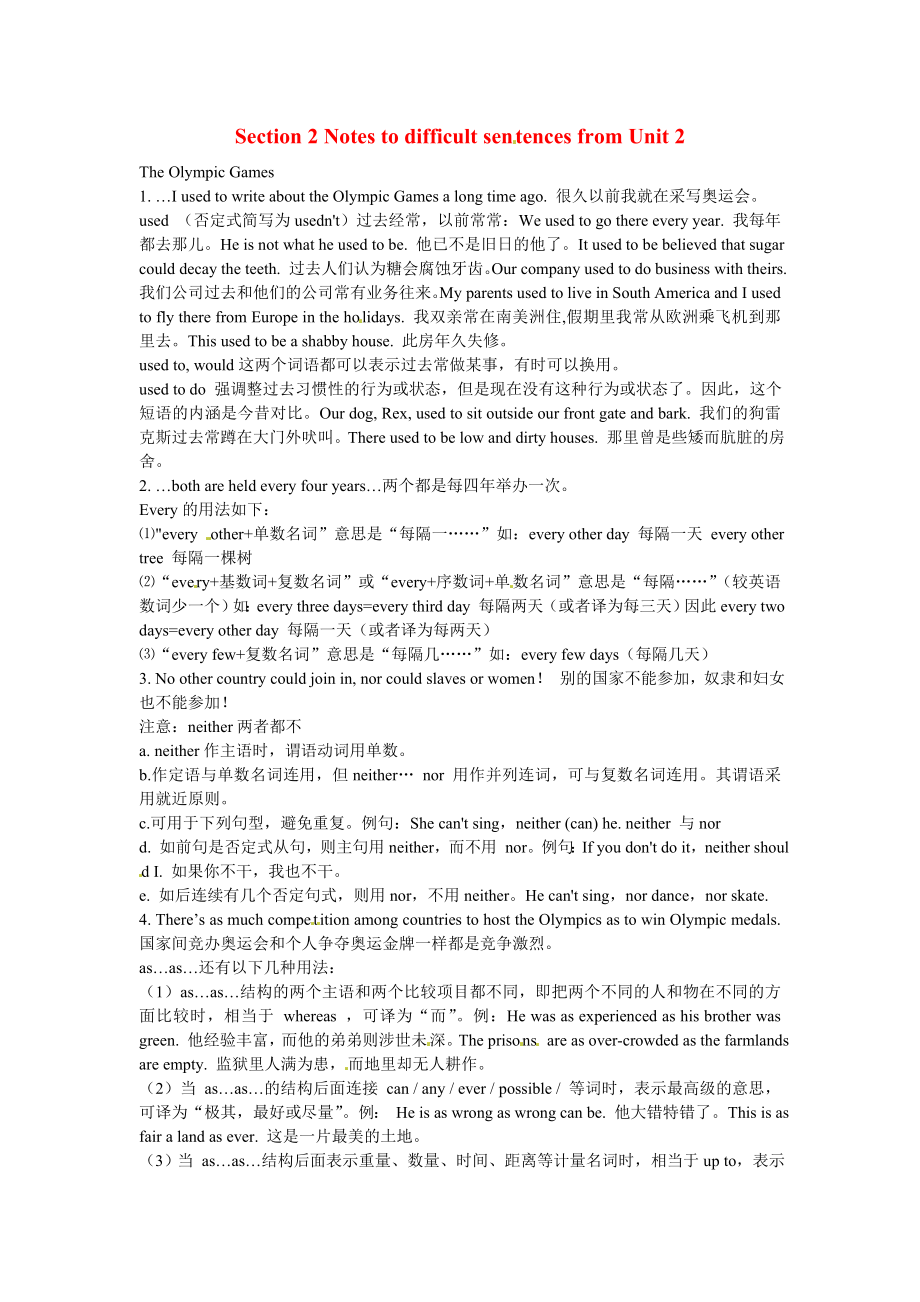《浙江省2013年高中英語 Unit2 the olympic games疑難解析 新人教版必修2》由會員分享��,可在線閱讀����,更多相關(guān)《浙江省2013年高中英語 Unit2 the olympic games疑難解析 新人教版必修2(2頁珍藏版)》請在裝配圖網(wǎng)上搜索。
1����、Section 2 Notes to difficult sentences from Unit 2
The Olympic Games
1. …I used to write about the Olympic Games a long time ago. 很久以前我就在采寫奧運(yùn)會。
used (否定式簡寫為usedn't)過去經(jīng)常�����,以前常常:We used to go there every year. 我每年都去那兒。He is not what he used to be. 他已不是舊日的他了���。It used to be believed that sugar could dec
2��、ay the teeth. 過去人們認(rèn)為糖會腐蝕牙齒��。Our company used to do business with theirs. 我們公司過去和他們的公司常有業(yè)務(wù)往來����。My parents used to live in South America and I used to fly there from Europe in the holidays. 我雙親常在南美洲住,假期里我常從歐洲乘飛機(jī)到那里去�����。This used to be a shabby house. 此房年久失修�����。
used to, would這兩個詞語都可以表示過去常做某事�,有時可以換用��。
used to
3�、do 強(qiáng)調(diào)整過去習(xí)慣性的行為或狀態(tài),但是現(xiàn)在沒有這種行為或狀態(tài)了���。因此����,這個短語的內(nèi)涵是今昔對比。Our dog, Rex, used to sit outside our front gate and bark. 我們的狗雷克斯過去常蹲在大門外吠叫�����。There used to be low and dirty houses. 那里曾是些矮而骯臟的房舍��。
2. …both are held every four years…兩個都是每四年舉辦一次�。
Every的用法如下:
⑴"every other+單數(shù)名詞”意思是“每隔一……”如:every other day 每隔一天 every
4、other tree 每隔一棵樹
⑵“every+基數(shù)詞+復(fù)數(shù)名詞”或“every+序數(shù)詞+單數(shù)名詞”意思是“每隔……”(較英語數(shù)詞少一個)如:every three days=every third day 每隔兩天(或者譯為每三天)因此every two days=every other day 每隔一天(或者譯為每兩天)
⑶“every few+復(fù)數(shù)名詞”意思是“每隔幾……”如:every few days(每隔幾天)
3. No other country could join in, nor could slaves or women�����! 別的國家不能參加���,奴隸和婦女也不能參加
5��、����!
注意:neither兩者都不
a. neither作主語時,謂語動詞用單數(shù)���。
b.作定語與單數(shù)名詞連用��,但neither… nor 用作并列連詞�����,可與復(fù)數(shù)名詞連用���。其謂語采用就近原則。
c.可用于下列句型����,避免重復(fù)。例句:She can't sing�����,neither (can) he. neither 與nor
d. 如前句是否定式從句�����,則主句用neither��,而不用 nor����。例句:If you don't do it,neither should I. 如果你不干����,我也不干。
e. 如后連續(xù)有幾個否定句式��,則用nor�����,不用neither���。He can't sing�,nor
6����、dance,nor skate.
4. There’s as much competition among countries to host the Olympics as to win Olympic medals. 國家間競辦奧運(yùn)會和個人爭奪奧運(yùn)金牌一樣都是競爭激烈����。
as…as…還有以下幾種用法:
(1)as…as…結(jié)構(gòu)的兩個主語和兩個比較項目都不同,即把兩個不同的人和物在不同的方面比較時,相當(dāng)于 whereas �����,可譯為“而”�。例:He was as experienced as his brother was green. 他經(jīng)驗豐富,而他的弟弟則涉世未深���。The priso
7�����、ns are as over-crowded as the farmlands are empty. 監(jiān)獄里人滿為患���,而地里卻無人耕作。
(2)當(dāng) as…as…的結(jié)構(gòu)后面連接 can / any / ever / possible / 等詞時��,表示最高級的意思�����,可譯為“極其��,最好或盡量”����。例: He is as wrong as wrong can be. 他大錯特錯了。This is as fair a land as ever. 這是一片最美的土地����。
(3)當(dāng) as…as…結(jié)構(gòu)后面表示重量、數(shù)量�、時間、距離等計量名詞時���,相當(dāng)于up to��,表示程度�,可譯為“達(dá)到……”�。例: The river is as deep as 10 meters. 此河深達(dá) 10 米。At night���, the temperature on the moon may be as low as -160 ℃. 在夜晚�,月球的溫度可能低至零下 160 度���。
 浙江省2013年高中英語 Unit2 the olympic games疑難解析 新人教版必修2
浙江省2013年高中英語 Unit2 the olympic games疑難解析 新人教版必修2

